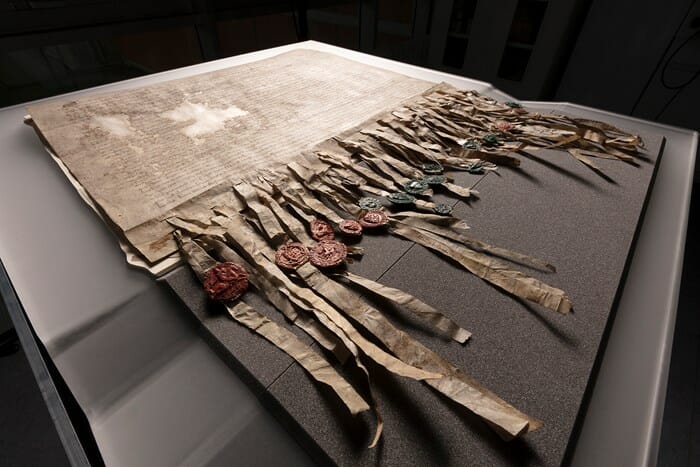From National Museums Scotland: Don’t miss this rare opportunity to see one of the most important documents in Scottish history – the Declaration of Arbroath.
Please note, we expect this to be popular and you may have to queue.
The Declaration of Arbroath is a letter dated 6 April 1320 written by the barons and freeholders of the Kingdom of Scotland to Pope John XXII. The letter asked the pope to recognise Scotland’s independence and acknowledge Robert the Bruce as the country’s lawful king.

The Declaration of Arbroath. Mike Brooks © King’s Printer for Scotland, National Records of Scotland, SP13-7
Despite the Scots’ success at the Battle of Bannockburn, Robert I had not been recognised as king by either King Edward II of England or the Pope. At the time, the Pope desired peace between England and Scotland so that both kingdoms could help in a crusade to the Holy Land. The Declaration sought to influence him by offering the possibility of support from the Scots for his long-desired crusade if they no longer had to fear English invasion.
Written in Latin, it was sealed by eight earls and about 40 barons. It was authenticated by seals, as documents at that time were not signed. Only 19 seals now remain.
The surviving Declaration is a medieval copy of the letter, the original having been dispatched to the pope in Avignon. It is cared for by National Records of Scotland and is so fragile that it can only be displayed occasionally in order to ensure its long-term preservation. Don’t miss this rare opportunity to see it.
about the Declaration of Arbroath, and
from The National Records of Scotland.
Join curator Dr Alice Blackwell and National Records of Scotland conservator Hazel de Vere for an in-person event at the National Museum of Scotland discussing the Declaration of Arbroath’s historical significance and material fragility on 20 June.
Limited slots are available for UK-Educational Groups. Please see our
page for further information.

We might be forgiven for thinking that the second of the Avignon Popes, John XXII (1316 – 1334) had enough on his plate without taking on the Earls and Barons of Scotland (1320 Declaration of Arbroath above) after his earlier enlightenment by Prince Domhnall Ó Neill of Tír Eoghain and the rest of the Irish princes and chieftains in their more complex letter to the new Pope in 1317: ‘Remonstrance of the Irish Princes to Pope John XXII’.
publish.ucc.ie/celt/document/T3100000-001
A remonstrance of 13 long paragraphs of detail beginning: “Lest the sharp-toothed and viperous calumny of the English and their untrue representations should to any degree excite your mind against us and the defenders of our right, which God forbid …………”
Neither the Irish Remonstrance nor the Arbroath Declaration deterred John XXII from excommunicating all the enemies of the English King, Edward II, including Robert the Bruce and his brother Edward, though the Remonstrance may have resulted in a mild papal warning to Edward II that the grant of Ireland to Henry II by the English Pope Nicholas Breakspear (Adrian IV) might well be reviewed or revoked further down the road.
But then, did either the Remonstrance or the Declaration ever get to Avignon;? Were the 1317 and 1320 documents the result of close consultation between Irish Chieftains and Scottish Earls? Or indeed could either or both letters be later fakes? I leave it to the historians among you.
Eddie, I am surprised you didn’t mention why Adrian IV was able to grant Ireland to Henry II.
In those days the Popes “owned” the world after the first Christian Emperor, Constantine, gifted the world to Pope Sylvester after his miraculous cure from leprosy.
I suppose he — Constantine — felt it was the least he could do — The Donation of Constantine!!
Paddy @2, In order to say something one does not need to say everything every time. The context in which Adrian IV and John XXII were able and expected to operate stemmed directly from that Donation of Constantine – but I took it that anyone on this forum should be familiar with that context already.
Fair point, Eddie.